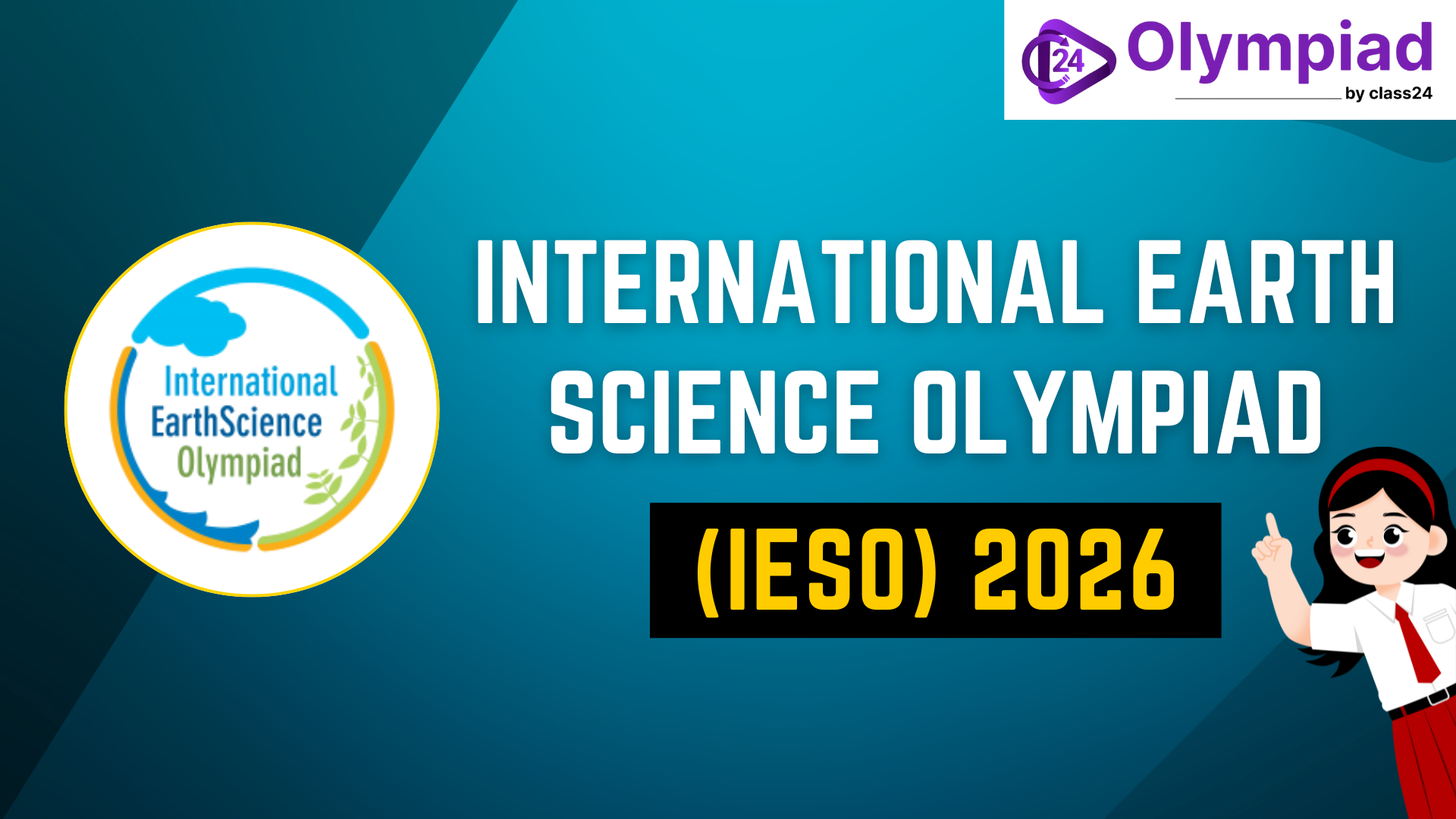
International Earth Science Olympiad (IESO) is a world-renowned science competition that is intended to be used with school children who are interested in learning more about geology, geophysics, meteorology, oceanography, astronomy, and environmental science. Another activity, organized annually by the International Geoscience Education Organization (IGEO), is IESO, which gives a unique, prestigious opportunity to young learners to prepare as a thinker, environmentalist and practical problem solver via theory tests, field studies and human global interactions.
In India, the Olympiad selection is done at the national level by the Geological Society of India (GSI), and the process starts with the IESO Entrance Test 2026. Being the first and the most crucial stage in the path of the student who wants to become a qualified candidate to get his chance in the national training camp and eventually tour to the international front-line on behalf of India. You can also get the latest and correct information with regard to IESO 2026 in this guide that covers its date of exam, date of registration, eligibility, exam pattern, syllabus of the exam, stages of training and the performance of India in the same.
The IESO (International Earth Science Olympiad) is a global Earth science competition that is attended by the best school students every year in 30 or more countries. The Olympiad, which began in 2007 in Daegu, South Korea, is dedicated to geology, meteorology, oceanography, astronomy, environmental science and real-world problem solving on Earth.
Unlike regular written exams, IESO is a unique mix of theory + practical + team-based learning, where students participate in:
Theory examinations
Overall, IESO helps students build strong scientific thinking, environmental awareness, and global collaboration skills — exactly what today’s world needs.
To help students understand the exam clearly, here is the complete and detailed overview of the International Earth Science Olympiad (IESO) 2026 including exam date, subjects, mode, and national-level selection details.
IESO 2026: Key Highlights (Detailed Table)
| Attribute | Details |
|---|---|
| Exam Name | International Earth Science Olympiad (IESO) 2026 |
| Conducting Body (India) | Geological Society of India (GSI) |
| Purpose of Exam | To select Indian students for the International Earth Science Olympiad 2026 |
| Entrance Test Date (India) | 24 January 2026 (Saturday) |
| Exam Timing | 10:30 AM (Total Duration: 90 Minutes) |
| Exam Mode | Offline Pen-and-Paper Test |
| Type of Questions | Objective-Type (MCQs) |
| Medium of Exam | English Only |
| Subjects Covered | Geology, Geophysics, Meteorology, Oceanography, Terrestrial Astronomy, Environmental Science |
| Difficulty Level | Moderate to High (Olympiad Standard) |
| Eligibility (India) | School students as per GSI guidelines |
| Official Syllabus Link | geosocindia.org/index.php/ieso |
| Selection Stages (India) | Entrance Test → Training Camp → Final International Olympiad |
| Final International Olympiad | IESO 2026 (Venue to be officially announced) |
| Organized Internationally By | International Geoscience Education Organization (IGEO) |
| Participating Countries | 30+ Nations Every Year |
| Focus Areas of IESO | Earth Sciences, Field Work, Practical Analysis, Team Activities |
The IESO 2026 registration period is stated quite explicitly in the official reminder, and the students should not miss these deadlines. The Centre Registration and Student Registration also differ in the time schedules, and being punctual in the process is paramount to appearing in the IESO Entrance test 2026.
10 November 2025 to 10 December 2025
During this period, schools, coaching institutes and well-known educational centres are obliged to apply with the aim of registering themselves as official examination centres. The IESO Entrance Test can only be administered in these approved centres, and they also receive applications from students. Centres would be expected to place all information at the right location on time.
10 November 2025 to 25 December 2025
Students seeking to appear for the IESO 2026 Entrance Test will have to register at an approved centre. Only an already registered centre will be accepted in case of the application. The students would be expected to complete the right information, post the necessary documents before the deadline and pay the fees.
gsi.manageexam.com
Both students and centres must use only the official portal for filling out the IESO 2026 registration form. This ensures correct information, avoids fake websites, and prevents errors during the application process.
The first and most significant phase of India’s national selection process for choosing the student who will attend the International Earth Science Olympiad is the IESO Entrance Test 2026. The test assesses your conceptual knowledge of sciences related to the Earth in the format of an objective-type examination.
IESO Entrance Test Date & Exam Pattern 2026
| Exam Component | Details |
|---|---|
| Exam Date | 24 January 2026 (Saturday) |
| Start Time | 10:30 AM |
| Duration | 90 Minutes |
| Question Type | Objective-Type (MCQs) |
| Mode of Exam | Offline |
| Language | English |
Note: The entrance test is designed to check your clarity of concepts, analytical ability, and basic understanding of different branches of Earth science.
You will be tested on the following subjects:
Note: These topics ensure that students understand the Earth as a complete system — including its structure, weather, oceans, space environment, and ecological balance.
To appear for the IESO Entrance Test 2026 and represent India at the international level, students must fulfill the following eligibility requirements:
Any student who meets these criteria can confidently apply for the IESO Entrance Test 2026 and begin their journey toward representing India internationally.
The IESO selection procedure in India is aimed at confirming the most intelligent students in Earth sciences and training them for a contest in an international competition. According to the official notice, this process is divided into four main stages and includes theory and practical skills, teamwork, and real-world Earth science applications.
Stage 1: National Level Entrance Test (ET)
Stage 2: Training Camp & INESO
3-week residential camp (May–June 2026)
Stage 3: Pre-Departure Training Camp
Stage 4: International Earth Science Olympiad (IESO 2026)
Quick Table Summary:
| Stage | Duration | Key Outcome |
|---|---|---|
| National Entrance Test | 90 min | Qualify for Training Camp |
| Training Camp & INESO | 3 Weeks | Top 4 selected for Team India |
| Pre-Departure Camp | 1 Week | International preparation |
| International Olympiad | Varies | Compete globally |
The IESO 2026 syllabus has major subjects, which are Geosphere, Atmosphere, Hydrosphere, and Astronomy. Teaching topics are minerals and rocks, descriptions of the Earth’s plates, the various types of weather systems, the movement of oceans, and the location of the Earth as compared to other things. The syllabus will adopt a systems approach and encourage students to explore how various parts of the Earth are connected to each other. The idea suggests assisting learners in acquiring good critical thinking and mastering the Earth sciences.
| Category | Topics Covered |
|---|---|
| Geosphere and Earth Systems | - Earth’s internal structure, rocks and minerals - Plate tectonics and geodynamics - Landforms and geomorphology - Volcanology and seismology |
| Hydrosphere and Earth Systems | - Ocean currents and circulation - Hydrological cycle and water resources - Marine ecosystems and oceanography |
| Atmosphere and Earth Systems | - Weather systems and meteorological phenomena - Climate change and atmospheric chemistry - Air pollution and atmospheric dynamics |
| Planetary System and Earth Systems | - Solar system and planetary geology - Earth’s place in the universe - Space weather and astronomy |
The 2026 International Earth Science Olympiad is organized using a four-part selection process. This exam tests what students have learned and can do in Earth sciences based on both theory and hands-on activities. The IESO hopes to increase students’ interest in Earth sciences.
| Stage | Description | Focus/Components |
|---|---|---|
| 1. National Level Entrance Test (ET) | Initial screening test to select eligible candidates for training camp and further stages. | Theoretical knowledge in Earth sciences |
| 2. Training Camp & Indian National Earth Science Olympiad (INESO) | Intensive three-week training and national-level competition to finalize the Indian team. | Theoretical and practical preparation |
| 3. Pre-Departure Training Camp | Final training for the selected team focusing on advanced topics and team coordination before IESO. | Advanced Earth science concepts and teamwork |
| 4. International Earth Science Olympiad (IESO) | Global competition where the Indian team competes with international participants. | Theoretical tests, practical fieldwork, projects |
Note:
India showcased excellent talent and preparation at IESO 2025, held in Jining, China from 8–16 August 2025.
India’s Medal Tally – 2025
Students Who Represented India
These remarkable achievements reflect the strength of India’s training programs, dedication of the students, and the effectiveness of national-level preparation for international Earth science competitions.
Preparing for IESO 2026 requires a mix of concept clarity, practical understanding, and analytical thinking. Here are the most effective tips for students.
1. Understand the Syllabus Thoroughly
2. Practice Objective Questions
3. Focus on Conceptual Clarity
4. Hands-On Learning
5. Time Management & Revision
6. Stay Updated
7. Mock Tests & Self-Assessment
Participating in the International Earth Science Olympiad (IESO) 2026 offers students academic recognition, skill development, and international exposure. Here’s why every Earth science enthusiast should take part.
1. Academic Recognition
2. Skill Development
3. International Exposure
4. Research & Career Opportunities
5. Real-World Scientific Understanding
IESO 2026 is more than just an exam it’s a platform to grow academically, develop skills, and represent India internationally.
| 📄 PYP Name | 🔗 Download PDF |
|---|---|
| Indian National Earth Science Olympiad (INESO 2024) | Download Now |
| NATIONAL / INTERNATIONAL EARTH SCIENCE OLYMPIAD - Entrance Test (2017) | Download Now |
| EARTH SCIENCE OLYMPIAD – Entrance Test (2016) | Download Now |
| 📘 Practice Topic | 🔗 Download PDF |
|---|---|
| Practice Test for Biodiversity and Conservation | Download Now |
| Practice Test for Water, Waste and Pollution | Download Now |
| Practice Test for Sustainable Development | Download Now |
| Practice Test for Energy Types and Conservation | Download Now |
| Practice Test for Ecosystems and Biodiversity Review | Download Now |
| Practice Test for Climate and Human Impact | Download Now |
| Practice Test for Current Affairs, International Treaties and Agreements | Download Now |
| Practice Test for Indian Sustainability Policies and Global Climate | Download Now |
| Practice Test for Climate Change and Global Warming – Set 2 | Download Now |
| Practice Test for Climate Change and Global Warming | Download Now |




Leave a Comment